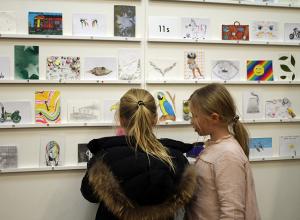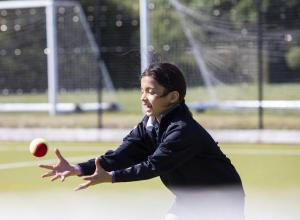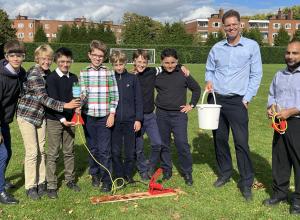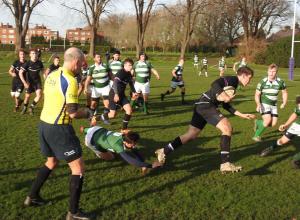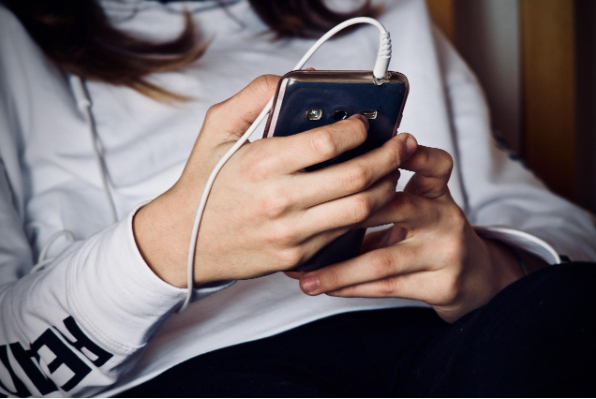
On this occasion, I am offering my blog as a vehicle for another. While this is me (Mr Woodward - hello!) kicking off proceedings, the post that follows has been written by my colleague Guy Holder - Business teacher extraordinaire and Head of PSHE across the school. He is an ambassador and enthusiastic supporter of the fast-growing campaign urging parents to stand together and Delay Smartphones. Indeed, he has, over the past few years, become something of an expert regarding the reasons why that might be a good and important idea. I know I was significantly influenced by his excellent Thomson Society presentation on the subject back in 2022.
So, without further ado, and letting you decide for yourself whether you find the argument convincing, allow me to introduce… Mr Holder:

“Something went suddenly and horribly wrong for adolescents in the early 2010s”. So begins a recent essay by Jonathan Haidt, one of my inspirations in what I think is the most important issue facing our society today: the harm being done to children by unfettered internet access, chiefly via the smartphone.
The aim of this short essay is to convince you that we need to take action, that the evidence is compelling and that an alternative vision for childhood is there, if we want it. The benefits of the internet are manifest; so too are the harms.

To make the case, I am going to adopt some of the elements of the Threshold Test that can be used by the CPS, when deciding whether to charge a suspect.
- Are there reasonable grounds to suspect wrongdoing?
- Is it possible to obtain further evidence that proves the case?
- Does the seriousness warrant an immediate charging?
There is a wealth of evidence to demonstrate ‘reasonable grounds’, with just some examples below:
- Rates of depression and anxiety amongst children have increased markedly since 2010, doubling for teenage girls. This increase corresponds to the adoption of the smartphone.
- Cases of sexual harassment among pupils has, according to Wales’ lead schools police officer, “become the norm”.
- By age nine, 10% of children have seen pornography; 27% by age 11
- 57% more teens were sleep deprived in 2015 than in 1991
- Cyberbullying is now more common than face to face bullying
I could go on (and on). From the digital childhoods report to the deep work of Gabor Mate, there is now a wealth of evidence that supports the increasing sense of alarm that is being felt by parents, educators and wider society.
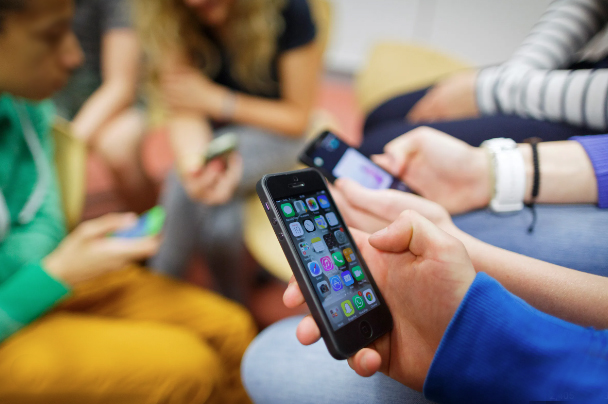
This can be contested. To give just one example, intergenerational comparisons of depression and self harm amongst children becomes increasingly challenging the further back in time we look, due to a lack of comparable data. I can write with confidence that it has definitely increased since 2010 but who is to say how it compares to, say, the 1970s? And even if it has increased, how sure are we that the smartphone is the culprit?
Interrogating the evidence is always needed. But the examples provided above only scratch the surface. To give one more, a recent study by Sapien Labs found that adults who acquired their first smartphone later in life have “progressively better mental wellbeing” for each year that the smartphone was delayed (the effect more pronounced amongst females). This is a significant study, with a sample of nearly 28,000 people. The sheer weight of evidence, in number, range and reputability, is such that the first Threshold Test is well passed. There are clearly “reasonable grounds” to suspect that something very wrong has taken place since 2010 and that the smartphone, the portal that is overwhelmingly used by children to access the internet, is the primary cause.
A recent study by Sapien Labs found that adults who acquired their first smartphone later in life have “progressively better mental wellbeing” for each year that the smartphone was delayed
Threshold Test 2 asks if it is possible to obtain further evidence. It seems to me that not a day goes by without another study, news story or pronouncement from an esteemed public figure, that indicates something is seriously wrong with smartphones and children. From the appalling case of an abuser who ‘catfished’ more than 60 people to the tragic murder of Brianna Ghey to Ofcom's latest report, stating that violent online content is “unavoidable” for children, further evidence seems, sadly, inevitable. It is likely that by the time we hit ‘publish’ on this essay, yet another tragic piece of evidence will be in the headlines, with the smartphone in the frame, yet again.
Finally, Threshold 3: is the case serious? This is close to a rhetorical question because, of course, caring for children is inherently a serious topic. It is serious because what occurs in childhood can shape adulthood; because harm being done to children has ripple effects on us all, on parents, families, schools and societies; and because childhood is a life stage that deserves protection. This last is not a whimsical rose-tinted glasses view. Children as young as ten are being pressured into sending nude images. Three quarters of 15-16 year olds have been sent a video of a beheading. This is extremely upsetting and very serious. Childhood has been profoundly altered by the smartphone and the manner in which it has been altered is not of our choosing.
The threshold tests having been met, the suspect now charged, what of the action? I have been following this issue for some time and believe that the Delay Smartphones movement is the best we have. Legislation will, I hope, follow, but we cannot wait any longer.
I have been following this issue for some time and believe that the Delay Smartphones movement is the best we have. Legislation will, I hope, follow, but we cannot wait any longer
Jonathan Haidt has aptly named the current malaise a “collective action problem”. Parents are faced with two invidious choices: socially isolate their child by not buying them a smartphone or buy them a smartphone and attempt to mitigate the harm. The way out of this terrible conundrum is to end the scenario of social isolation, by working together to delay the timing of when our children receive smartphones.
The Delay Smartphone movement asks that parents make a pledge to delay ownership until at least 14 years old (and social media until 16). It suggests great alternatives, such as internet free mobile phones, GPS trackers, watches and Spotify enabled music players. These, combined with a laptop at home, provide the basis for a smartphone-free digital environment for our children. This will require effort on our part, but not that much. It will protect children from the worst of current harms. And, by chance, it will actually save money!
The Delay Smartphone movement asks that parents make a pledge to delay ownership until at least 14 years old (and social media until 16). It suggests great alternatives, such as internet free mobile phones, GPS trackers, watches and Spotify enabled music players
Harrodian, with its 4-18 years old intake and community focus, is well positioned to be one of the few but growing number of schools that seizes the opportunity to change things for the better. It will have to be parent led, because only parents can agree upon and enforce a smartphone-free environment for their children. But if not now, in the face of the compelling evidence, when?
If not us, when we have the platform to make this change, then who?

